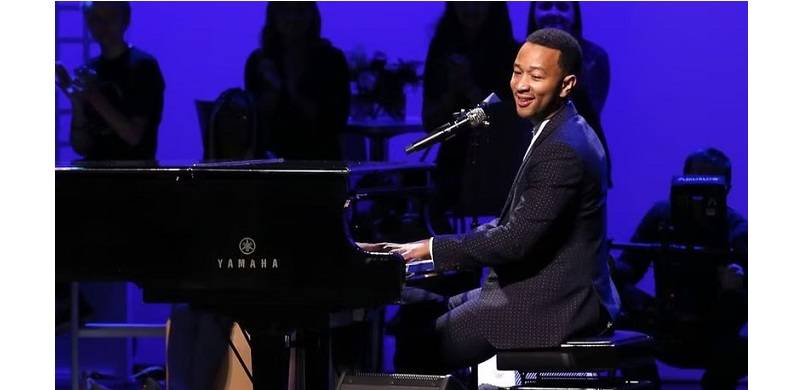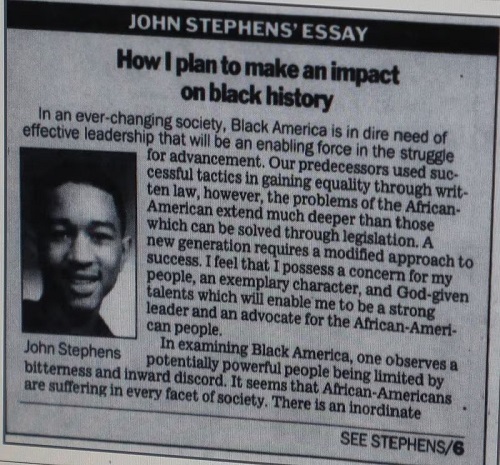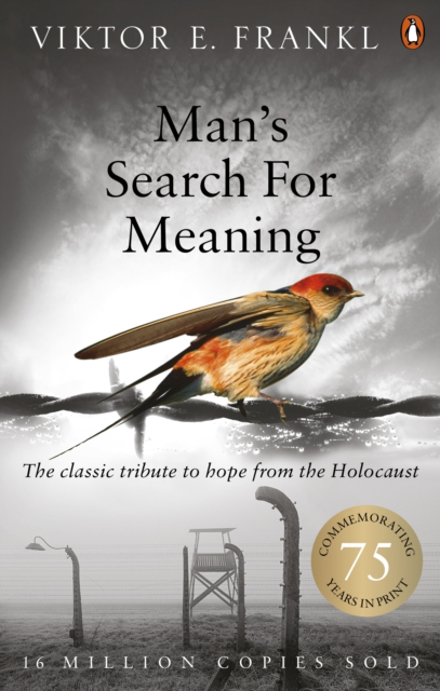
Do you ever wonder why some people thrive despite very adverse circumstances and others get overcome by them. Are optimists and pessimists products of nature or nurture?
Recently, I attended a John Legend concert in Washington DC which changed my perspective on this matter. As the first African American ever to have acquired an Emmy, Grammy, Oscar and Tony (EGOT), he is hailed as musical royalty in the US, with an impressive 31 Grammy nominations and a dozen wins, as well as commercial and critical acclaim. He embodies suave sophistication. His journey from Springfield, Ohio, and into corporate life as a management consultant at BCG is almost miraculous.
Unlike typical musical performances, Legend took over the stage on his piano and a memoir-like slide show of his life, art and musical influences. From his young childhood in a very orthodox Pentacostal church to where he stands today is an inspirational story. He began singing in the church choir which his mother directed and her mother in turn played the organ.
He was one of four children, home-schooled and part of a closely knit family which would gather every week at church. Music and faith formed the fabric that wove his interest, passion and talent together. As his family life fell apart, it was also the panacea for his pain and suffering. It kept him channeled towards what he wanted his life to be.
His story is a powerful example of self-actualisation. His teens were not easy. The death of the family matriarch – the grandmother – led his mother to a deep depression and eventually abandonment of her family. She suffered addiction, incarceration in the prison system and estrangement from her children for over a decade. Legend ended up starting formal school for the first time at age 10 and by the age of 12, he was regarded as having genius-level aptitude. He graduated at age 16 with a choice of Ivy League colleges, including Harvard and University of Pennsylvania. He chose U- Penn for its proximity to the rich Philadelphia music scene, ended up rooming with a boy who was Kanye’s West cousin and the rest as they say is history.
 As a young teenager, he knew his dream. At age 16, he won a McDonalds essay competition on how he would contribute to Black America. His answer was simple, but it showcased his commitment to craft and provided an early vision that led him to where he is today. “I envision a successful musical career that will allow me to obtain high visibility in the community, and enable me to be a strong leader and an advocate for the African American people.”
As a young teenager, he knew his dream. At age 16, he won a McDonalds essay competition on how he would contribute to Black America. His answer was simple, but it showcased his commitment to craft and provided an early vision that led him to where he is today. “I envision a successful musical career that will allow me to obtain high visibility in the community, and enable me to be a strong leader and an advocate for the African American people.”
This may sound like a classic American dream – a success story – but listening to his words and music, it was more than that. How can someone be transformed by such difficult circumstances and trauma and not reduced by them, instead using it as a channel for personal growth and passion.
There are entire books of academic psychology that point out that we have more control than we think over our lives. We have a choice in most things – even if we feel like we don’t. These days, we are all victims of some sort of trauma – over the state of our country and its chaos, its economic and political policies, the new world order, the changed dynamics post-COVID and its effect on society as a whole. It has played havoc not just with countries but with groups, families and individuals. I don’t know a single person who is not going through something difficult, anywhere in the world. We all have our challenges to confront.
While listening to Legend’s soothing voice, I could not help but feel that his message – of joy, faith, hope and optimism – is one we all need to hear and internalise each day. He clearly had his choices in this life: to be defined by the financial hardship and emotional difficulties of his childhood or to channel them into something larger than himself. He chose the pursuit of excellence, the ability to share his magnetic gift with audiences all over the world, and now more recently, uses his voice as a political activist to effect change in criminal justice reform.
During those two hours, Legend connected deeply with an audience of thousands of strangers, and was able to convey authenticity, generosity of spirit, the force of his convictions and an infectious joy for music. It was as if an invisible thread was tying us all together by music and his voice to lift our collective spirits. It was a disarming performance – laced with humour, self-awareness and magnetic charisma.
In leadership research, there is a strong link between the change in our lives, the resilience to respond to it and the activism of joy, even in the most difficult of circumstances. Psychiatrist Victor Frankl, a Holocaust survivor, explored the power of mind set and meaning in his legendary book “Man’s Search for Meaning”.
 The idea is simple in theory but so difficult to execute in practice – that one can find meaning in one’s experience and a sense of purpose that allows us not just to function, but to grow from that experience and to help others. Nietzsche’s will to power aligns with this notion – that those who have a why or purpose to live can bear with almost any how. According to Frankl: “Everything can be taken from a man but one thing. The last of the human freedoms – to choose one’s attitude in any given circumstances, to choose one’s way [.] Between stimulus and response, there is a space. In that space, there is a power to choose our responses. In our response, lies our growth and freedom.”
The idea is simple in theory but so difficult to execute in practice – that one can find meaning in one’s experience and a sense of purpose that allows us not just to function, but to grow from that experience and to help others. Nietzsche’s will to power aligns with this notion – that those who have a why or purpose to live can bear with almost any how. According to Frankl: “Everything can be taken from a man but one thing. The last of the human freedoms – to choose one’s attitude in any given circumstances, to choose one’s way [.] Between stimulus and response, there is a space. In that space, there is a power to choose our responses. In our response, lies our growth and freedom.”
John Legend epitomised Frankl’s attitude towards life. His passion and way to navigate the world was through music and that has remained a constant since he was a young boy. If we are to learn from these men, it is to follow our dreams and aspirations but also have the discipline to channel this into our daily lives, almost like elite athletes – by practicing and getting back up when life doesn’t work the way we want it to.
On the way back home, I wondered whether Rumi had the same thing in mind when he used music, spirituality and lyrical poetry in his own compositions almost eight centuries ago. “Yesterday I was clever and I tried to change the world, and this year I am wise so I am changing myself.”
Each of us will have a different approach to the meaning of life. We must begin with ourselves, our potential and our experiences but it is up to each of us – day after day – to wake up and fight for what we want in our lives. And for me, that will certainly mean perfecting my piano skill and voice technique. It may not be my why but it can certainly be the how to include joy in my own life!
Recently, I attended a John Legend concert in Washington DC which changed my perspective on this matter. As the first African American ever to have acquired an Emmy, Grammy, Oscar and Tony (EGOT), he is hailed as musical royalty in the US, with an impressive 31 Grammy nominations and a dozen wins, as well as commercial and critical acclaim. He embodies suave sophistication. His journey from Springfield, Ohio, and into corporate life as a management consultant at BCG is almost miraculous.
Unlike typical musical performances, Legend took over the stage on his piano and a memoir-like slide show of his life, art and musical influences. From his young childhood in a very orthodox Pentacostal church to where he stands today is an inspirational story. He began singing in the church choir which his mother directed and her mother in turn played the organ.
He was one of four children, home-schooled and part of a closely knit family which would gather every week at church. Music and faith formed the fabric that wove his interest, passion and talent together. As his family life fell apart, it was also the panacea for his pain and suffering. It kept him channeled towards what he wanted his life to be.
His story is a powerful example of self-actualisation. His teens were not easy. The death of the family matriarch – the grandmother – led his mother to a deep depression and eventually abandonment of her family. She suffered addiction, incarceration in the prison system and estrangement from her children for over a decade. Legend ended up starting formal school for the first time at age 10 and by the age of 12, he was regarded as having genius-level aptitude. He graduated at age 16 with a choice of Ivy League colleges, including Harvard and University of Pennsylvania. He chose U- Penn for its proximity to the rich Philadelphia music scene, ended up rooming with a boy who was Kanye’s West cousin and the rest as they say is history.
 As a young teenager, he knew his dream. At age 16, he won a McDonalds essay competition on how he would contribute to Black America. His answer was simple, but it showcased his commitment to craft and provided an early vision that led him to where he is today. “I envision a successful musical career that will allow me to obtain high visibility in the community, and enable me to be a strong leader and an advocate for the African American people.”
As a young teenager, he knew his dream. At age 16, he won a McDonalds essay competition on how he would contribute to Black America. His answer was simple, but it showcased his commitment to craft and provided an early vision that led him to where he is today. “I envision a successful musical career that will allow me to obtain high visibility in the community, and enable me to be a strong leader and an advocate for the African American people.”This may sound like a classic American dream – a success story – but listening to his words and music, it was more than that. How can someone be transformed by such difficult circumstances and trauma and not reduced by them, instead using it as a channel for personal growth and passion.
There are entire books of academic psychology that point out that we have more control than we think over our lives. We have a choice in most things – even if we feel like we don’t. These days, we are all victims of some sort of trauma – over the state of our country and its chaos, its economic and political policies, the new world order, the changed dynamics post-COVID and its effect on society as a whole. It has played havoc not just with countries but with groups, families and individuals. I don’t know a single person who is not going through something difficult, anywhere in the world. We all have our challenges to confront.
While listening to Legend’s soothing voice, I could not help but feel that his message – of joy, faith, hope and optimism – is one we all need to hear and internalise each day. He clearly had his choices in this life: to be defined by the financial hardship and emotional difficulties of his childhood or to channel them into something larger than himself. He chose the pursuit of excellence, the ability to share his magnetic gift with audiences all over the world, and now more recently, uses his voice as a political activist to effect change in criminal justice reform.
During those two hours, Legend connected deeply with an audience of thousands of strangers, and was able to convey authenticity, generosity of spirit, the force of his convictions and an infectious joy for music. It was as if an invisible thread was tying us all together by music and his voice to lift our collective spirits. It was a disarming performance – laced with humour, self-awareness and magnetic charisma.
In leadership research, there is a strong link between the change in our lives, the resilience to respond to it and the activism of joy, even in the most difficult of circumstances. Psychiatrist Victor Frankl, a Holocaust survivor, explored the power of mind set and meaning in his legendary book “Man’s Search for Meaning”.
 The idea is simple in theory but so difficult to execute in practice – that one can find meaning in one’s experience and a sense of purpose that allows us not just to function, but to grow from that experience and to help others. Nietzsche’s will to power aligns with this notion – that those who have a why or purpose to live can bear with almost any how. According to Frankl: “Everything can be taken from a man but one thing. The last of the human freedoms – to choose one’s attitude in any given circumstances, to choose one’s way [.] Between stimulus and response, there is a space. In that space, there is a power to choose our responses. In our response, lies our growth and freedom.”
The idea is simple in theory but so difficult to execute in practice – that one can find meaning in one’s experience and a sense of purpose that allows us not just to function, but to grow from that experience and to help others. Nietzsche’s will to power aligns with this notion – that those who have a why or purpose to live can bear with almost any how. According to Frankl: “Everything can be taken from a man but one thing. The last of the human freedoms – to choose one’s attitude in any given circumstances, to choose one’s way [.] Between stimulus and response, there is a space. In that space, there is a power to choose our responses. In our response, lies our growth and freedom.”John Legend epitomised Frankl’s attitude towards life. His passion and way to navigate the world was through music and that has remained a constant since he was a young boy. If we are to learn from these men, it is to follow our dreams and aspirations but also have the discipline to channel this into our daily lives, almost like elite athletes – by practicing and getting back up when life doesn’t work the way we want it to.
On the way back home, I wondered whether Rumi had the same thing in mind when he used music, spirituality and lyrical poetry in his own compositions almost eight centuries ago. “Yesterday I was clever and I tried to change the world, and this year I am wise so I am changing myself.”
Each of us will have a different approach to the meaning of life. We must begin with ourselves, our potential and our experiences but it is up to each of us – day after day – to wake up and fight for what we want in our lives. And for me, that will certainly mean perfecting my piano skill and voice technique. It may not be my why but it can certainly be the how to include joy in my own life!

